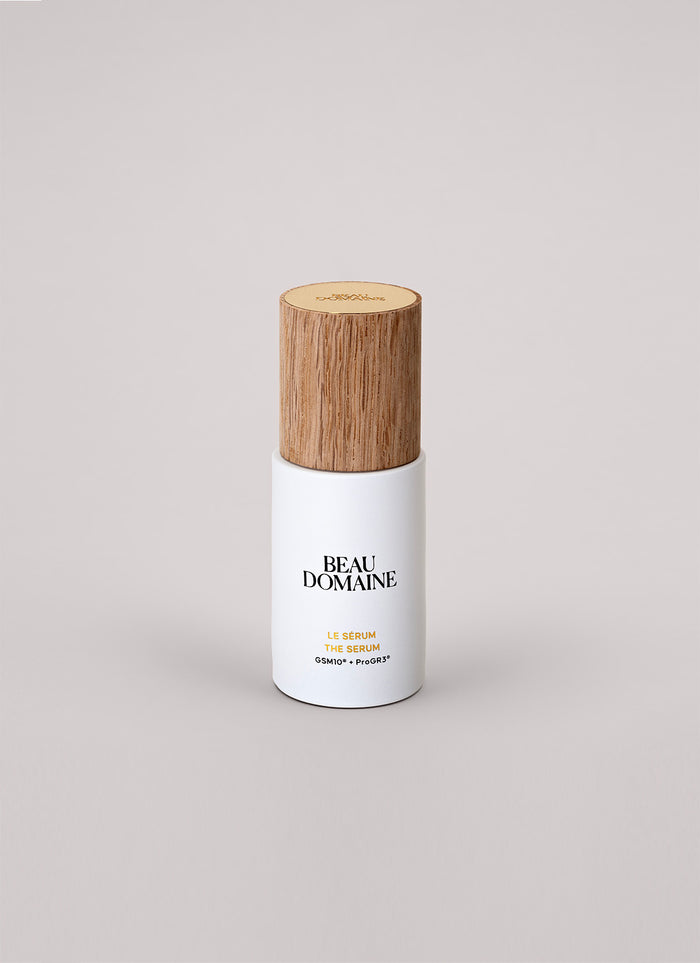How to Keep Black Skin Healthy?
Our Best Tip: Prioritizing Hydration
Hydration is key to maintaining the health and appearance of black skin. Every step of your beauty routine should incorporate hydration to prevent the onset of fine lines and wrinkles. In your evening skincare routine, after thorough cleansing, consider using a moisturizing toner, followed by a daily moisturizer. Look for ingredients like hyaluronic acid, glycerin, argan oil, and various natural oils like almond oil, coconut oil, and avocado oil, all of which contribute to retaining moisture, nourishing the skin, and keeping it hydrated. If you have combination skin, The Fluid Cream by Beau Domaine is a very good choice. With its light texture, it lets the skin hydrated while being quickly absorbed.
Note: It's important to know that pure oils and butters (like shea butter), applied directly to the skin are not moisturizers. They help in replenishing the skin's lipids but lack moisturizers' ability to hydrate the skin. However, you can use shea butter to replenish your body's hydrolipidic barrier.
The First Step to a Face Routine: Gentle Cleansing
As with any kind of skin tone, rule N°1 is thorough makeup removal and gentle cleansing. No matter your skin type, this step is crucial for maintaining healthy skin. Avoid harsh soaps that can strip the skin of its natural oils. Opt for gentle cleansing products like cleansing milk or cleansing oil. Consider double cleansing, a two-step makeup removal technique that includes an oily phase (cleansing oil) and an aqueous phase (gentle cleanser without sulfated surfactants). Or opt for a one-step gentle product like The Cleaning Emulsion by Le Domaine. When showering, you can use a shower oil or black soap for a gentler, non-irritating cleansing experience.
Beauty Products for Skin Tone and Hyperpigmentation
While melanated skin is dense and resilient, it can still be sensitive and reactive to external factors. To maintain even skin tone and prevent pigmentation spots, follow these important rules:
- Scrub and Exfoliate in Moderation: Exfoliation helps in removing dead skin cells, but it should be done with caution. Limit exfoliation to once or twice a month and choose gentle exfoliants. Excessive exfoliation can irritate the skin and stimulate sebum production, leading to dehydration and oiliness.
- Protect Your Skin from the Sun: While black skin has some natural UV resistance, it's not immune to sun damage. Prolonged sun exposure can result in pigmentation spots. Hence, sunscreen remains essential for limiting hyperpigmentation. Opt for an SPF 30 or 50+ sunscreen, even on cloudy days, and avoid extended sun exposure.
- Treat Acne Issues with Gentleness: Black skin has a tendency to heal slowly and can be susceptible to keloid formation, a type of scarring characterized by the overproduction of tissue around wounds. It's crucial to avoid picking at or squeezing pimples to prevent exacerbating the issue. Give your skin time to heal naturally, and opt for gentle skin care products like Aloe Vera-based products to soothe and calm irritated skin.
In the case of severe acne flare-ups, it's advisable to consult a specialized dermatologist for personalized advice and treatment options.
What not to Use on Black Skin?
- Skin Care Routine not Adapted to Your Skin Type: When selecting skincare products, pay close attention to their compatibility with your skin's unique characteristics. Although your skin may appear shiny in some places, it doesn't mean it is oily. Black skin has a tendency towards combination skin, which means a combination of oily and dry skin on different parts of the face. If unsure, you can always consult our article on how to recognize the skin type you have. Choosing gentle, preferably natural products is recommended, specially to avoid the appearance of fine lines and wrinkles. Avoid overly chemical skincare products and opt for those that are alcohol-free and non-comedogenic to protect your skin's health.
- Skin-Lightening Products: Avoid skin-lightening products formulated with cortisone and hydroquinone. Research shows that these components can be carcinogenic and cause dark spots. Instead, choose anti-spot products that contain ingredients such as glycolic acid (AHA) and salicylic acid (BHA) for gentle exfoliation. Vitamin C has antioxidant properties that can help even skin tone, and natural extracts like licorice extract and marshmallow root extract, can be used to reduce dark spots.
Black skin is a testament to beauty's diversity and uniqueness. Proper care and attention to its specific characteristics can help you achieve and maintain radiant, healthy skin. The key objectives in your skincare routine should be hydration, gentleness and prevention. By following these rules and choosing suitable products, you can preserve the beauty of your black skin and ensure it thrives for years to come. Remember to cherish the individuality of your skin and give it the care it deserves.



























